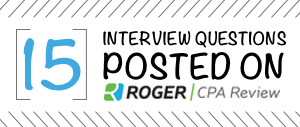How old is too old? Well I think you’ll be surprised.
Here is a question I got this week from a TBC fan:
Hi Andrew,
Hope all is well! Your new websites look fantastic and it looks like you’ve got a seriously solid core of followers happening – congrats on the success!! Have you discussed on the site or on the podcast trying to secure employment with the Big 4 when you’re older (i.e. like me)? Or the value of the experience? I sometimes think that I should go grind at a big public accounting firm to get that experience under my belt and pay my dues, but I’m not a student fresh out of college anymore (never was, really) which I think would present challenges getting hired.
What do you think?
Often times I see people posted on LinkedIn or on twitter about how “you must have a super high GPA and you can only get a job with the big 4 while you’re in college”.
Both of which are completely false.
When I counsel Bean Counter fans in resume reviews, I often tell them my 5-5-5 rule.
What is the 5-5-5 rule?
For every 15 people that work at the firm:
- 5 of them were interns and were always going to work there,
- 5 were hired right when they graduated university and;
- 5 are experience hires who get hired after they get experience elsewhere
The recent announcement from Ernst & Young that they’ll be hiring 15,500 new employees in their 2015 fiscal year could support my 5-5-5 rule and will actually tip the scales slightly toward older, and experience hires.
When you look at they’re plans, Ernst & Young plans to recruit approximately 6.500 experienced professionals along with nearly 9,000 students. And that’s just in the US!
That means 41% of new EY employees will already have experience in accounting.
So what does experienced hire mean?
An experienced hire is an individual who already has work experience, most likely in accounting. While experience in public accounting is generally preferred, it is by no means a pre-requisite for finding a position in the big 4.
In fact, I worked with multiple individuals whom had never worked in public accounting in their life, and we’re hired at PwC.
What can you expect if you’re hired as “experienced” but have no public accounting experience?
You may be surprised to learn that getting hired at big 4 firms can be done without public accounting experience, but there is a catch. You will most likely be coming into the firm and be treated as a lower level staff member.
Typically in public accounting, it takes 2-3 years to be promoted to senior associate. In fact, here is the general breakdown by firm:
Number of years to become a senior:
- Deloitte (2)
- PwC (3)
- EY (2)
- KPMG (2)
If you are hired as “experienced” and have 0 years of public accounting experience, you’ll be counted as having <1 year of experience.
What if you have 5+ years of experience?
It doesn’t matter. It’s not because your not brilliant, but these firms have a process, and a methodology that takes time and experience to learn. When you’re a senior, you may be expected to manage your own clients, and supervise your own teams.
If you’ve never audited Cash, AP, Debt, PP&E, or anything else….. you wouldn’t even want to be given the responsibility. It would most likely end in soul crushing embarrassment and you being let go from the firm.
VIDEO: Watch Me Critique An Accounting Resume.
Should I try to get into the Big 4 if I already have experience?
That depends. But here are some general thoughts on the subject.
With the environment nowadays, you may want to consider working for the Big 4 if you plan to:
- Work for a large multinational corporation
- Work for a public corporation
- Are interested in compliance and/or Sarbanes Oxley
- Are interested in being a partner at a top 25-50 accounting firm
- Would like support in working abroad
- Would like to work in internal audit
For many experienced individuals, the sacrifices you have to make to spend a few years in the Big 4 aren’t worth the rewards and career opportunities. You can expect to earn around 65K coming in as an experienced hire and 6-12% raises each year with a potential to reach 20% in your promotion years. And while many people have horror stories of working long hours at these firms (as evidenced by the misery in the comment section of Going Concern), it’s not always the case.
LEARN: All the Steps You Need to Take to Become A Licensed CPA.
When you’re interviewing, make sure you ask about the workload and talk to lower level employees. Try to get a feel for how much work you’ll have to put in and if you’re okay with that.
I personally believe the opportunities outside of the big 4 firms can be just as rewarding money-wise and don’t carry quite as much time commitment.
So how can I get one of these Big 4 accounting firm jobs?
Here are the detail steps to take for anyone looking to get hired by the Big 4 Firms:
- Prepare a cover letter & resume
- Reach out to your network and see if you can get any introductions to Big 4 firm recruiters of employees
- Prepare a list of at least 20 firms you want to work for
- Email at least two (preferably 3) employees from each target company in the target office
- Ensure there is at least 1 recruiter or HR manager that you’re emailing
But with that being said, it’s a big personal choice to make. I’m happy to share my thoughts with you if you let me know more about your situation in the comments below!
P.S. want to learn what you can earn in the Big 4? Get a copy of my Public Accounting Salary Guide.








Follow Us!